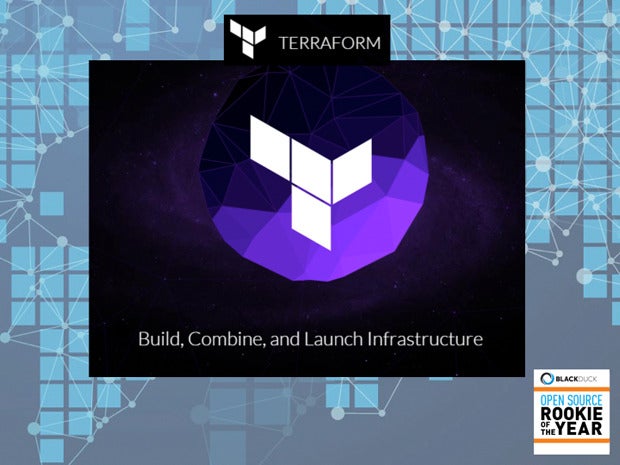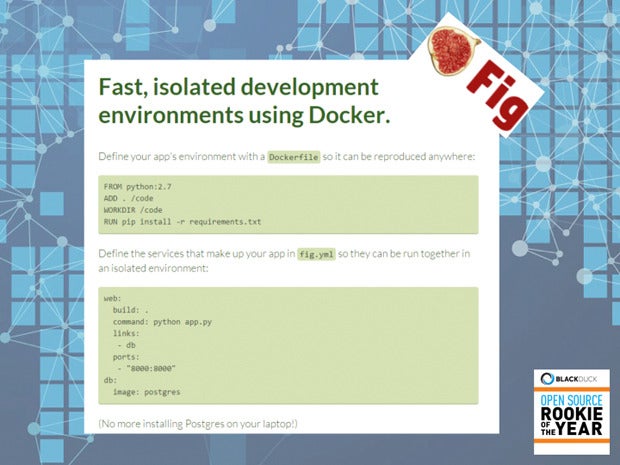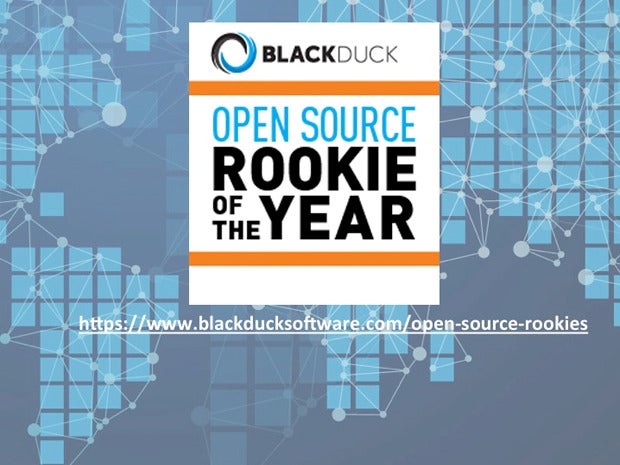mirror of
https://github.com/LCTT/TranslateProject.git
synced 2025-01-07 22:11:09 +08:00
153 lines
15 KiB
Markdown
153 lines
15 KiB
Markdown
The top 10 rookie open source projects
|
||
================================================================================
|
||
Black Duck presents its Open Source Rookies of the Year -- the 10 most exciting, active new projects germinated by the global open source community
|
||
|
||

|
||
|
||
### Open Source Rookies of the Year ###
|
||
|
||
Each year sees the start of thousands of new open source projects. Only a handful gets real traction. Some projects gain momentum by building on existing, well-known technologies; others truly break new ground. Many projects are created to solve a simple development problem, while others begin with loftier intentions shared by like-minded developers around the world.
|
||
|
||
Since 2009, the open source software logistics company Black Duck has identified the [Open Source Rookies of the Year][1], based on activity tracked by its [Open Hub][2] (formerly Ohloh) site. This year, we're delighted to present 10 winners and two honorable mentions for 2015, selected from thousands of open source projects. Using a weighted scoring system, points were awarded based on project activity, the pace of commits, and several other factors.
|
||
|
||
Open source has become the industry's engine of innovation. This year, for example, growth in projects related to Docker containerization trumped every other rookie area -- and not coincidentally reflected the most exciting area of enterprise technology overall. At the very least, the projects described here provide a window on what the global open source developer community is thinking, which is fast becoming a good indicator of where we're headed.
|
||
|
||
### 2015 Open Source Rookie of the Year: DebOps ###
|
||
|
||

|
||
|
||
[DebOps][3] is a collection of [Ansible][4] playbooks and roles, scalable from one container to an entire data center. Founder Maciej Delmanowski open-sourced DebOps to ensure his work outlived his current work environment and could grow in strength and depth from outside contributors.
|
||
|
||
DebOps began at a small university in Poland that ran its own data center, where everything was configured by hand. Crashes sometimes led to days of downtime -- and Delmanowski realized that a configuration management system was needed. Starting with a Debian base, DebOps is a group of Ansible playbooks that configure an entire data infrastructure. The project has been implemented in many different working environments, and the founders plan to continue supporting and improving it as time goes on.
|
||
|
||
### 2015 Open Source Rookie of the Year: Code Combat ###
|
||
|
||

|
||
|
||
The traditional pen-and-paper way of learning falls short for technical subjects. Games, however, are all about engagement -- which is why the founders of [CodeCombat][5] went about creating a multiplayer programming game to teach people how to code.
|
||
|
||
At its inception, CodeCombat was an idea for a startup, but the founders decided to create an open source project instead. The idea blossomed within the community, and the project gained contributors at a steady rate. A mere two months after its launch, the game was accepted into Google’s Summer of Code. The game reaches a broad audience and is available in 45 languages. CodeCombat hopes to become the standard for people who want to learn to code and have fun at the same time.
|
||
|
||
### 2015 Open Source Rookie of the Year: Storj ###
|
||
|
||

|
||
|
||
[Storj][6] is a peer-to-peer cloud storage network that implements end-to-end encryption, enabling users to transfer and share data without reliance on a third party. Based on bitcoin blockchain technology and peer-to-peer protocols, Storj provides secure, private, and encrypted cloud storage.
|
||
|
||
Opponents of cloud-based data storage worry about cost efficiencies and vulnerability to attack. Intended to address both concerns, Storj is a private cloud storage marketplace where space is purchased and traded via Storjcoin X (SJCX). Files uploaded to Storj are shredded, encrypted, and stored across the community. File owners are the sole individuals who possess keys to the encrypted information.
|
||
|
||
The proof of concept for this decentralized cloud storage marketplace was first presented at the Texas Bitcoin Conference Hackathon in 2014. After winning first place in the hackathon, the project founders and leaders used open forums, Reddit, bitcoin forums, and social media to grow an active community, now an essential part of the Storj decision-making process.
|
||
|
||
### 2015 Open Source Rookie of the Year: Neovim ###
|
||
|
||

|
||
|
||
Since its inception in 1991, Vim has been a beloved text editor adopted by millions of software developers. [Neovim][6] is the next generation.
|
||
|
||
The software development ecosystem has experienced exponential growth and innovation over the past 23 years. Neovim founder Thiago de Arruda knew that Vim was lacking in modern-day features and development speed. Although determined to preserve the signature features of Vim, the community behind Neovim seeks to improve and evolve the technology of its favorite text editor. Crowdfunding initially enabled de Arruda to focus six uninterrupted months on launching this endeavor. He credits the Neovim community for supporting the project and for inspiring him to continue contributing.
|
||
|
||
### 2015 Open Source Rookie of the Year: CockroachDB ###
|
||
|
||

|
||
|
||
Former Googlers are bringing a big-company data solution to open source in the form of [CockroachDB][8], a scalable, geo-replicated, transactional data store.
|
||
|
||
To maintain the terabytes of data transacted over its global online properties, Google developed Spanner. This powerful tool provides Google with scalability, survivability, and transactionality -- qualities that the team behind CockroachDB is serving up to the open source community. Like an actual cockroach, CockroachDB can survive without its head, tolerating the failure of any node. This open source project has a devoted community of experienced contributors, actively cultivated by the founders via social media, GitHub, networking, conferences, and meet-ups.
|
||
|
||
### 2015 Open Source Rookie of the Year: Kubernetes ###
|
||
|
||

|
||
|
||
In introducing containerized software development to the open source community, [Docker][9] has become the backbone of a strong, innovative set of tools and technologies. [Kubernetes][10], which Google introduced last June, is an open source container management tool used to accelerate development and simplify operations.
|
||
|
||
Google has been using containers for years in its internal operations. At the summer 2014 DockerCon, the Internet giant open-sourced Kubernetes, which was developed to meet the needs of the exponentially growing Docker ecosystem. Through collaborations with other organizations and projects, such as Red Hat and CoreOS, Kubernetes project managers have grown their project to be the No. 1 downloaded tool on the Docker Hub. The Kubernetes team hopes to expand the project and grow the community, so software developers can spend less time managing infrastructure and more time building the apps they want.
|
||
|
||
### 2015 Open Source Rookie of the Year: Open Bazaar ###
|
||
|
||

|
||
|
||
[OpenBazaar][11] is a decentralized marketplace for trading with anyone using bitcoin. The proof of concept for OpenBazaar was born at a hackathon, where its founders combined BitTorent, bitcoin, and traditional financial server methodologies to create a censorship-resistant trading platform. The OpenBazaar team sought new members, and before long they were able to expand the OpenBazaar community immensely. The table stakes of OpenBazaar -- transparency and a common goal to revolutionize trade and commerce -- are helping founders and contributors work toward a real-world, uncontrolled, and decentralized marketplace.
|
||
|
||
### 2015 Open Source Rookie of the Year: IPFS ###
|
||
|
||

|
||
|
||
[IPFS (InterPlanetary File System)][12] is a global, versioned, peer-to-peer file system.It synthesizes many of the ideas behind Git, BitTorrent, and HTTP to bring a new data and data structure transport protocol to the open Web.
|
||
|
||
Open source is known for developing simple solutions to complex problems that result in many innovations, but these powerful projects represent only one slice of the open source community. IFPS belong to a more radical group whose proof of concept seems daring, outrageous, and even unattainable -- in this case, a peer-to-peer distributed file system that seeks to connect all computing devices. This possible HTTP replacement maintains a community through multiple mediums, including the Git community and an IRC channel that has more than 100 current contributors. This “crazy” idea will be available for alpha testing in 2015.
|
||
|
||
### 2015 Open Source Rookie of the Year: cAdvisor ###
|
||
|
||

|
||
|
||
[cAdvisor (Container Advisor)][13] is a daemon that collects, aggregates, processes, and exports information about running containers, providing container users with an understanding of resource usage and performance characteristics. For each container, cAdvisor keeps resource isolation parameters, historical resource usage, histograms of complete historical resource usage, and network statistics. This data is exported by container and across machines.
|
||
|
||
cAdvisor can run on most Linux distros and supports many container types, including Docker. It has become the de facto monitoring agent for containers, has been integrated into many systems, and is one of the most downloaded images on the Docker Hub. The team hopes to grow cAdvisor to understand application performance more deeply and to integrate this information into clusterwide systems.
|
||
|
||
### 2015 Open Source Rookie of the Year: Terraform ###
|
||
|
||

|
||
|
||
[Terraform][14] provides a common configuration to launch infrastructure, from physical and virtual servers to email and DNS providers. The idea is to encompass everything from custom in-house solutions to services offered by public cloud platforms. Once launched, Terraform enables ops to change infrastructure safely and efficiently as the configuration evolves.
|
||
|
||
Working at a devops company, Terraform.io's founders identified a pain point in codifying the knowledge required to build a complete data center, from plugged-in servers to a fully networked and functional data center. Infrastructure is described using a high-level configuration syntax, which allows a blueprint of your data center to be versioned and treated as you would any other code. Sponsorship from the well-respected open source company HashiCorp helped launch the project.
|
||
|
||
### Honorable mention: Docker Fig ###
|
||
|
||

|
||
|
||
[Fig][15] provides fast, isolated development environments using [Docker][16]. It moves the configuration required to orchestrate Docker into a simple fig.yml file. It handles all the work of building and running containers and forwarding their ports, as well as sharing volumes and linking them.
|
||
|
||
Orchard formed Fig last year to create a new system of tools to make Docker work. It was developed as a way of setting up development environments with Docker, enabling users to define the exact environment for their apps, while also running databases and caches inside Docker. Fig solved a major pain point for developers. Docker fully supports this open source project and [recently purchased Orchard][17] to expand the reach of Fig.
|
||
|
||
### Honorable mention: Drone ###
|
||
|
||

|
||
|
||
[Drone][18] is a Continuous Integration platform built on Docker and [written in Go][19]. The Drone project grew out of frustration with existing available technologies and processes for setting up development environments.
|
||
|
||
Drone provides a simple approach to automated testing and continuous delivery: Simply pick a Docker image tailored to your needs, connect GitHub, and commit. Drone uses Docker containers to provision isolated testing environments, giving every project complete control over its stack without the burden of traditional server administration. The community behind Drone is 100 contributors strong and hopes to bring this project to the enterprise and to mobile app development.
|
||
|
||
### Open source rookies ###
|
||
|
||

|
||
|
||
- [Open Source Rookies of the 2014 Year][20]
|
||
- [InfoWorld's 2015 Technology of the Year Award winners][21]
|
||
- [Bossies: The Best of Open Source Software Awards][22]
|
||
- [15 essential open source tools for Windows admins][23]
|
||
|
||
--------------------------------------------------------------------------------
|
||
|
||
via: http://www.infoworld.com/article/2875439/open-source-software/the-top-10-rookie-open-source-projects.html
|
||
|
||
作者:[Black Duck Software][a]
|
||
译者:[译者ID](https://github.com/译者ID)
|
||
校对:[校对者ID](https://github.com/校对者ID)
|
||
|
||
本文由 [LCTT](https://github.com/LCTT/TranslateProject) 原创翻译,[Linux中国](http://linux.cn/) 荣誉推出
|
||
|
||
[a]:http://www.infoworld.com/author/Black-Duck-Software/
|
||
[1]:https://www.blackducksoftware.com/open-source-rookies
|
||
[2]:https://www.openhub.net/
|
||
[3]:https://github.com/debops/debops
|
||
[4]:http://www.infoworld.com/article/2612397/data-center/review--ansible-orchestration-is-a-veteran-unix-admin-s-dream.html
|
||
[5]:https://codecombat.com/
|
||
[6]:http://storj.io/
|
||
[7]:http://neovim.org/
|
||
[8]:https://github.com/cockroachdb/cockroach
|
||
[9]:http://www.infoworld.com/resources/16373/application-virtualization/the-beginners-guide-to-docker
|
||
[10]:http://kubernetes.io/
|
||
[11]:https://openbazaar.org/
|
||
[12]:http://ipfs.io/
|
||
[13]:https://github.com/google/cadvisor
|
||
[14]:https://www.terraform.io/
|
||
[15]:http://www.fig.sh/
|
||
[16]:http://www.infoworld.com/resources/16373/application-virtualization/the-beginners-guide-to-docker
|
||
[17]:http://www.infoworld.com/article/2608546/application-virtualization/docker-acquires-orchard-in-a-sign-of-rising-ambitions.html
|
||
[18]:https://drone.io/
|
||
[19]:http://www.infoworld.com/article/2683845/google-go/164121-Fast-guide-to-Go-programming.html
|
||
[20]:https://www.blackducksoftware.com/open-source-rookies
|
||
[21]:http://www.infoworld.com/article/2871935/application-development/infoworlds-2015-technology-of-the-year-award-winners.html
|
||
[22]:http://www.infoworld.com/article/2688104/open-source-software/article.html
|
||
[23]:http://www.infoworld.com/article/2854954/microsoft-windows/15-essential-open-source-tools-for-windows-admins.html |